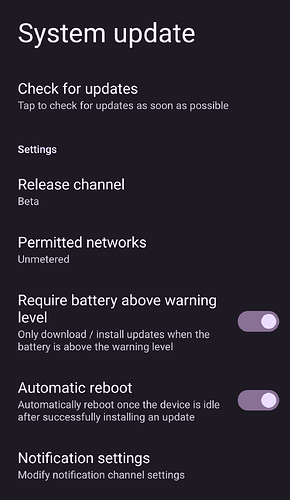Fedora Kinoite (to stay with KDE) also prebuilds images so dependency issues would be solved on their servers. Everything the user would do is download and apply.
If you have overlays (i.e. you change their system image by removing or adding packages) this could create some, but I never had them.
Fedora in general has way better updates than Debian, which I can imagine @WilsonEPhillips would run.
@Londeril No metered networks are mostly not a thing, which makes the network detection harder. KDE has a feature to manually set networks as metered, but this is opt-out (of “unmetered”) which means most people will not have set any networks as metered.
Also there are many systems that autoupdate, please dont mix your personal opinions or whatever in here. Some people might want it, and this is not the point of this thread.
This is about “if a user wants to have automatic updates, they should not eat their restricted data plan”.
Use cases:
- a user has setup automatic updates, for example a “Grandma Laptop”, a Child laptop or simply a machine with daily updates
- the user either has a business laptop with integrated WWAN card and SIMcard slot…
- OR they simply use their phones hotspot, which most will do
The latter case is important, as its not as easy as on Android, where restricted data simply is cell data. The OS thus has to detect if the Laptop is connected to a “wifi” that is actually a hotspot from a phone with 6GB of cell data or so. And then the OS has to pause automatic updates.
Note: This can be used for way more, apps can stop preloading images, a browser could go into datasaving mode (although not really implemented by websites),… Androids FOSS apps show how many possibilities there are.
So @Londeril please stop arguing about “is clicking ‘okay’ every day a problem?” because this is simply a workaround for the situation where you would actually want automatic updates, but would not want to ristk
- very high cell data usage
- a failing update as its done with 5% battery and without AC
- maybe high CPU load and very bad performance
- maybe energysaver mode where updates should be paused
this would simply adapt Linux systems to what Android can do since forever. I and a lot of other people want useful automatic updates. Ublue has automatic updates preconfigured, as “the Debian experience” is simply not what everyone experiences anymore. @WilsonEPhillips
Automatic updates, “forced to users” increase security a lot. Systems should at least to automatic security updates, but on many distros these are not separated so “Distros should do automatic updates”.
There is nothing wrong with an up-to-date system.
and again: if there would be a dependency problem, this could pause that one update and request GUI interaction (in the KDE-World via kdialog and a yes/no Dialog) how to deal with it.
So, back to the actual constructive discussion:
How do you think such an opt-in for unmetered networks could look like?
1. KDE welcome dialog
I imagine it in the setup dialog: “Select networks in which you would like to automatically update”
Problem here: networkmanager sets all networks as unmetered by default. Also on Setup you mostly only have one network set up.
2. Popup on every Wifi network
Whenever entering a wifi password, you already get the “enter password” dialog.
Why not integrate a checkbox “this network is unmetered” in there?
So users could opt-in to automatic updates in that network. If users are lazy, this would have no danger of eating their cell data plans.
